Smart Cities: A Systematic Review of Emerging Technologies
Abstract
Highlights
- Smart cities are increasingly enabled by the convergence of the IoT, the computing continuum, and artificial intelligence.
- The computing continuum (edge–fog–cloud–HPC) plays a central role in handling data locality, scalability, and responsiveness.
- The integration of emerging paradigms into smart cities enables real-time, citizen-centric, and sustainable urban services.
- Policies and governance must evolve alongside technology to address ethical, privacy, and digital divide concerns.
Abstract
1. Introduction
- Smart Governance: Transparent, participatory, and data-driven decision-making. Digital platforms streamline citizen interaction with government services. ICT tools enable e-voting, digital licences, and online grievance redressal systems, promoting transparency and efficiency.
- Smart Mobility: Efficient, clean, and integrated transportation systems. ICT-based solutions encompass intelligent transport systems (ITS), GPS vehicle tracking, and app-based integration of public transport. Real-time data help manage traffic and provide commuters with live updates.
- Smart Environment: Sustainable resource management and environmental protection. ICT systems monitor and manage energy grids, water distribution, and waste disposal. Smart meters and grid automation reduce losses and ensure efficient use of resources.
- Smart Healthcare: High-quality health services supported by technology. Telemedicine, remote diagnostics, and ICT-powered digital platforms improve access to healthcare, especially during emergencies such as pandemics.
- Smart Public Safety: ICT-based video surveillance, facial recognition, and emergency response systems enhance urban safety. AI-driven analytics support law enforcement and disaster management.
- Smart Society: Educated, creative, and digitally empowered citizens. Innovation-driven economic development is fostered through the ICT resources of smart cities.
2. Materials and Methods
- RQ1.
- What are the core technologies supporting data collection, processing, and integration in smart cities, and how can they be classified?
- RQ2.
- How do emerging paradigms such as the computing continuum and artificial intelligence contribute to the development of smart city applications?
- RQ3.
- What are the main challenges in the design and implementation of smart city systems, and what technologies are currently used to address them?
3. Smart Cities: Main Technologies from an Information and Communication Technology Perspective
3.1. Internet of Things
3.2. Computing Continuum: Edge, Fog, Cloud
3.2.1. Scalable Execution for Smart City Services
3.2.2. Distributed Trust for Smart City Services
3.2.3. Security Across the Continuum
3.2.4. Fulfilment of Non-Functional Requirements in the Continuum
3.3. Artificial Intelligence
- 1.
- 2.
3.4. Data Storage and Movement
3.5. Convergence of Sustainability and ICT in Smart Cities
4. Case Studies of Smart Cities
5. Discussion
- IoT layer: Devices such as industrial sensors, healthcare monitors, meteorological stations, and transport systems enable real-time data collection for automation and predictive tasks (e.g., preventive maintenance). Challenges include interoperability, limited power, and connectivity constraints.
- Edge layer: Provides local processing, reducing latency and improving resilience to connectivity loss, while shielding sensitive data. Challenges lie in ensuring data consistency, managing scarce resources, and handling failures.
- Fog layer: Acts as an intermediary, reducing bandwidth usage and supporting offline operation. However, fog infrastructures face issues of reliability, interoperability, and high deployment costs.
- High-End Computing layer: Data centres and supercomputers support intensive analytics, visualisation, and large-scale prediction. They offer scalability and broad access but raise concerns about latency, privacy, vendor lock-in, and limited infrastructure control.
- Services: Platforms deliver monitoring, cybersecurity, predictive analytics, and citizen services. However, greater connectivity expands the attack surface and raises concerns about privacy, surveillance, open standards, and unequal access (digital divide).
- Privacy and surveillance: Mass data collection raises concerns about privacy, surveillance, and ethical AI. Strong legal frameworks and safeguards are needed.
- Digital divide: Unequal access to digital tools creates disparities. Limited access to databases and publication bias exacerbate this divide [133].
- High initial costs: Building smart infrastructure requires substantial investment. Scalable and modular architectures are necessary for sustainable growth.
6. Conclusions
Supplementary Materials
Funding
Acknowledgments
Conflicts of Interest
References
- Javed, A.R.; Shahzad, F.; ur Rehman, S.; Zikria, Y.B.; Razzak, I.; Jalil, Z.; Xu, G. Future smart cities: Requirements, emerging technologies, applications, challenges, and future aspects. Cities 2022, 129, 103794. [Google Scholar] [CrossRef]
- Belcastro, L.; Marozzo, F.; Orsino, A.; Talia, D.; Trunfio, P. Using the compute continuum for data analysis: Edge-cloud integration for urban mobility. In Proceedings of the 2023 31st Euromicro International Conference on Parallel, Distributed and Network-Based Processing (PDP), Naples, Italy, 1–3 March 2023; pp. 338–344. [Google Scholar]
- Kong, L.; Tan, J.; Huang, J.; Chen, G.; Wang, S.; Jin, X.; Zeng, P.; Khan, M.; Das, S.K. Edge-computing-driven internet of things: A survey. ACM Comput. Surv. 2022, 55, 1–41. [Google Scholar] [CrossRef]
- Hou, S.; Li, H.; Yang, C.; Wang, L. A new privacy-preserving framework based on edge-fog-cloud continuum for load forecasting. In Proceedings of the 2020 IEEE Wireless Communications and Networking Conference (WCNC), Seoul, Republic of Korea, 25–28 May 2020; pp. 1–8. [Google Scholar]
- Kozłowski, W.; Suwar, K. Smart city: Definitions, dimensions, and initiatives. Eur. Res. Stud. J. 2021, XXIV, 509–520. [Google Scholar] [CrossRef]
- Dahmane, W.M.; Ouchani, S.; Bouarfa, H. Smart cities services and solutions: A systematic review. Data Inf. Manag. 2024, 9, 100087. [Google Scholar] [CrossRef]
- Han, M.J.N.; Kim, M.J. A systematic review of smart city research from an urban context perspective. Cities 2024, 150, 105027. [Google Scholar] [CrossRef]
- Ateeq, A.; Milhem, M.; Alzoraiki, M.; Beshr, B.; Almeer, S.; Ali, S.A. The Rise of Smart Cities: Integrating Technology for Sustainable Urban Development. In Business Sustainability with Artificial Intelligence (AI): Challenges and Opportunities: Volume 1; Springer Nature: Cham, Switzerland, 2025; pp. 807–815. [Google Scholar] [CrossRef]
- International Telecommunication Union. ITU Smart Sustainable Cities. 2021. Available online: https://www.itu.int/en/ITU-T/ssc/united/Documents/Reports-on-SSC/ITU_smart_sustainable_cities_brochure.pdf?csf=1&e=yIueWP (accessed on 22 July 2025).
- Nations, U. THE 17 GOALS. Available online: https://sdgs.un.org/es/goals (accessed on 3 October 2025).
- Nations, U. Academic Impact: Sustainability. Available online: https://www.un.org/en/academic-impact/sustainability (accessed on 3 October 2025).
- Saxena, A.; Ramaswamy, M.; Beale, J.; Marciniuk, D.; Smith, P. Striving for the United Nations (UN) sustainable development goals (SDGs): What will it take? Discov. Sustain. 2021, 2, 20. [Google Scholar] [CrossRef]
- Mupfumira, P.; Mutingi, M.; Sony, M. Smart city frameworks SWOT analysis: A systematic literature review. Front. Sustain. Cities 2024, 6, 1449983. [Google Scholar] [CrossRef]
- Herath, H.; Mittal, M. Adoption of artificial intelligence in smart cities: A comprehensive review. Int. J. Inf. Manag. Data Insights 2022, 2, 100076. [Google Scholar] [CrossRef]
- Raj, P.; Raman, A.C. Intelligent Cities Enabling Tools and Technology; Auerbach Publications: Boca Raton, FL, USA, 2022. [Google Scholar]
- Page, M.J.; Moher, D.; Bossuyt, P.M.; Boutron, I.; Hoffmann, T.C.; Mulrow, C.D.; Shamseer, L.; Tetzlaff, J.M.; Akl, E.A.; Brennan, S.E.; et al. PRISMA 2020 explanation and elaboration: Updated guidance and exemplars for reporting systematic reviews. BMJ 2021, 372, n160. [Google Scholar] [CrossRef]
- Haddaway, N.R.; Page, M.J.; Pritchard, C.C.; McGuinness, L.A. PRISMA2020: An R package and Shiny app for producing PRISMA 2020-compliant flow diagrams, with interactivity for optimised digital transparency and Open Synthesis. Campbell Syst. Rev. 2022, 18, e1230. [Google Scholar] [CrossRef]
- Lea, R.; Adame, T.; Berne, A.; Azaiez, S. The Internet of Things, Fog, and Cloud Continuum: Integration Challenges and Opportunities for Smart Cities. Future Internet 2025, 17, 281. [Google Scholar] [CrossRef]
- Rosmaninho, R.; Raposo, D.; Rito, P.; Sargento, S. Edge-Cloud Continuum Orchestration of Critical Services: A Smart-City Approach. IEEE Trans. Serv. Comput. 2025, 18, 1381–1396. [Google Scholar] [CrossRef]
- Donta, P.K.; Murturi, I.; Casamayor Pujol, V.; Sedlak, B.; Dustdar, S. Exploring the Potential of Distributed Computing Continuum Systems. Computers 2023, 12, 198. [Google Scholar] [CrossRef]
- Ma, C.; Vu, H.Q.; Wang, J.; Trieu, V.H.; Li, G. Understanding residents’ behavior for smart city management by sequential and periodic pattern mining. IEEE Trans. Comput. Soc. Syst. 2023, 11, 1260–1276. [Google Scholar] [CrossRef]
- Zekić-Sušac, M.; Mitrović, S.; Has, A. Machine learning based system for managing energy efficiency of public sector as an approach towards smart cities. Int. J. Inf. Manag. 2021, 58, 102074. [Google Scholar] [CrossRef]
- Neelakandan, S.; Berlin, M.; Tripathi, S.; Devi, V.B.; Bhardwaj, I.; Arulkumar, N. IoT-based traffic prediction and traffic signal control system for smart city. Soft Comput. 2021, 25, 12241–12248. [Google Scholar] [CrossRef]
- Carrizales-Espinoza, D.; Sanchez-Gallegos, D.D.; Gonzalez-Compean, J.; Carretero, J. StructMesh: A storage framework for serverless computing continuum. Future Gener. Comput. Syst. 2024, 159, 353–369. [Google Scholar] [CrossRef]
- Antoniu, G.; Valduriez, P.; Hoppe, H.C.; Krüger, J. Towards Integrated Hardware/Software Ecosystems for the Edge-Cloud-HPC Continuum; ETP4HPC White Paper; Zenodo: Geneva, Switzerland, 2021. [Google Scholar] [CrossRef]
- Al-Maaitah, N.O.; Garcia-Blas, J.; Sanchez-Gallegos, G.; Carretero, J.; Vef, M.A.; Brinkmann, A. A comparative study of ad-hoc file systems for extreme scale computing. Future Gener. Comput. Syst. 2025, 170, 107815. [Google Scholar] [CrossRef]
- Del-Pozo-Puñal, E.; Garcia-Carballeira, F.; Camarmas-Alonso, D.; Calderon-Mateos, A. Hierarchical and distributed data storage for computing continuum. Future Gener. Comput. Syst. 2026, 174, 107931. [Google Scholar] [CrossRef]
- HYPER-AI Project. Revolutionising big data processing applications with self-abstracted and self-coordinated cloud-to-edge resources. 2024. Available online: https://hyper-ai-project.eu/ (accessed on 22 July 2025).
- EMPYREAN Project. Trustworthy, Cognitive and AI-driven Collaborative Associations of IoT Devices and Edge Resources for Data Processing. 2024. Available online: http://empyrean-horizon.eu/ (accessed on 22 July 2025).
- Kretsis, A.; Kokkinos, P.; Varvarigos, E.; Syrivelis, D.; Bakopoulos, P.; Sipos, M.; Fehér, M.; Lucani, D.; Bernabe, J.M.; Skarmeta, A.; et al. EMPYREAN: Trustworthy, Cognitive and AI-driven Collaborative Associations of IoT Devices and Edge Resources for Data Processing. In Proceedings of the 33rd International Symposium on High-Performance Parallel and Distributed Computing, Pisa, Italy, 3–7 June 2024; pp. 385–388. [Google Scholar]
- Hudson, N.; Hayot-Sasson, V.; Babuji, Y.; Baughman, M.; Pauloski, J.G.; Chard, R.; Foster, I.; Chard, K. Flight: A FaaS-based framework for complex and hierarchical federated learning. Future Gener. Comput. Syst. 2025, 174, 107998. [Google Scholar] [CrossRef]
- Zheng, W.; Kordas, J.; Skluzacek, T.J.; Kettimuthu, R.; Foster, I. Globus service enhancements for exascale applications and facilities. Int. J. High Perform. Comput. Appl. 2024, 38, 658–670. [Google Scholar] [CrossRef]
- José, R.; Rodrigues, H. A review on key innovation challenges for smart city initiatives. Smart Cities 2024, 7, 141–162. [Google Scholar] [CrossRef]
- Gulati, K.; Boddu, R.S.K.; Kapila, D.; Bangare, S.L.; Chandnani, N.; Saravanan, G. A review paper on wireless sensor network techniques in Internet of Things (IoT). Mater. Today Proc. 2022, 51, 161–165. [Google Scholar] [CrossRef]
- Mohammadzadeh, N.; Gholamzadeh, M.; Saeedi, S.; Rezayi, S. The application of wearable smart sensors for monitoring the vital signs of patients in epidemics: A systematic literature review. J. Ambient Intell. Humaniz. Comput. 2023, 14, 6027–6041. [Google Scholar] [CrossRef]
- Chen, X.; Deng, Y.; Ding, H.; Qu, G.; Zhang, H.; Li, P.; Fang, Y. Vehicle as a service (VaaS): Leverage vehicles to build service networks and capabilities for smart cities. IEEE Commun. Surv. Tutor. 2024, 26, 2048–2081. [Google Scholar] [CrossRef]
- Bellini, P.; Nesi, P.; Pantaleo, G. IoT-enabled smart cities: A review of concepts, frameworks and key technologies. Appl. Sci. 2022, 12, 1607. [Google Scholar] [CrossRef]
- Syrigos, I.; Angelopoulos, N.; Korakis, T. Optimization of execution for machine learning applications in the computing continuum. In Proceedings of the 2022 IEEE Conference on Standards for Communications and Networking (CSCN), Thessaloniki, Greece, 28–30 November 2022; pp. 118–123. [Google Scholar]
- Adel, A. Unlocking the future: Fostering human–machine collaboration and driving intelligent automation through industry 5.0 in smart cities. Smart Cities 2023, 6, 2742–2782. [Google Scholar] [CrossRef]
- Sharifani, K.; Amini, M. Machine learning and deep learning: A review of methods and applications. World Inf. Technol. Eng. J. 2023, 10, 3897–3904. [Google Scholar]
- Gecer, M.; Garbinato, B. Federated learning for mobility applications. ACM Comput. Surv. 2024, 56, 1–28. [Google Scholar] [CrossRef]
- Talebkhah, M.; Sali, A.; Marjani, M.; Gordan, M.; Hashim, S.J.; Rokhani, F.Z. IoT and big data applications in smart cities: Recent advances, challenges, and critical issues. IEEE Access 2021, 9, 55465–55484. [Google Scholar] [CrossRef]
- Sanchez-Gallegos, D.D.; Gonzalez-Compean, J.; Gonthier, M.; Hayot-Sasson, V.; Pauloski, J.G.; Pan, H.; Chard, K.; Carretero, J.; Foster, I. DynoStore: A wide-area distribution system for the management of data over heterogeneous storage. In Proceedings of the 25th IEEE/ACM International Symposium on Cluster, Cloud and Internet Computing (CCGRID), Tromso, Norway, 19–22 May 2025. [Google Scholar]
- Aslam, M.; Khan Abbasi, M.A.; Khalid, T.; Shan, R.U.; Ullah, S.; Ahmad, T.; Saeed, S.; Alabbad, D.A.; Ahmad, R. Getting smarter about smart cities: Improving data security and privacy through compliance. Sensors 2022, 22, 9338. [Google Scholar] [CrossRef]
- Chataut, R.; Phoummalayvane, A.; Akl, R. Unleashing the power of IoT: A comprehensive review of IoT applications and future prospects in healthcare, agriculture, smart homes, smart cities, and industry 4.0. Sensors 2023, 23, 7194. [Google Scholar] [CrossRef] [PubMed]
- Tuomala, V. IoT Productivity Versus Cybersecurity. Is the Risk Worth It? South-Eastern Finland University of Applied Sciences: Kouvola, Finland, 2021. [Google Scholar]
- Yalli, J.S.; Hasan, M.H.; Badawi, A.A. Internet of Things (IoT): Origins, embedded technologies, smart applications, and its growth in the last decade. IEEE Access 2024, 12, 91357–91382. [Google Scholar] [CrossRef]
- Ang, K.L.M.; Seng, J.K.P. Embedded Intelligence: Platform Technologies, Device Analytics, and Smart City Applications. IEEE Internet Things J. 2021, 8, 13165–13182. [Google Scholar] [CrossRef]
- Selvan, C.; Senthil Kumar, R.; Swamidason, I.T.J.; Malin Bruntha, P.; Amanullah, M.; Arulkumar, V. Traffic Prediction Using GPS Based Cloud Data Through RNN-LSTM-CNN Models: Addressing Road Congestion, Safety, and Sustainability in Smart Cities. SN Comput. Sci. 2025, 6, 159. [Google Scholar] [CrossRef]
- Ciuchi, C.; Bonciu, A.; Dinca, A.M.; Stoian, M. Challenges and opportunities in designing data structures for a smart city. Smart Cities Int. Conf. (SCIC) Proc. 2023, 11, 185–196. [Google Scholar]
- ur Rehman, A.; Alblushi, I.G.M.; Zia, M.F.; Khalid, H.M.; Inayat, U.; Benbouzid, M.; Muyeen, S.; Hussain, G.A. A solar-powered multi-functional portable charging device (SPMFPCD) with internet-of-things (IoT)-based real-time monitoring—An innovative scheme towards energy access and management. Green Technol. Sustain. 2025, 3, 100134. [Google Scholar] [CrossRef]
- Ali, Z.; Mahmood, A.; Khatoon, S.; Alhakami, W.; Ullah, S.S.; Iqbal, J.; Hussain, S. A Generic Internet of Things (IoT) Middleware for Smart City Applications. Sustainability 2023, 15, 743. [Google Scholar] [CrossRef]
- Ficili, I.; Giacobbe, M.; Tricomi, G.; Puliafito, A. From sensors to data intelligence: Leveraging IoT, cloud, and edge computing with AI. Sensors 2025, 25, 1763. [Google Scholar] [CrossRef]
- Samuel, R.A.C. Optimization and Orchestration in the Cloud-to-Edge Computing Continuum. Ph.D. Thesis, Unilu—University of Luxembourg, Luxembourg, 25 November 2024. [Google Scholar]
- Bassolillo, S.R.; D’Amato, E.; Notaro, I.; D’Agati, L.; Merlino, G.; Tricomi, G. Bridging ACO-Based Drone Logistics and Computing Continuum for Enhanced Smart City Applications. Drones 2025, 9, 368. [Google Scholar] [CrossRef]
- Nezami, Z.; Chaniotakis, E.; Pournaras, E. When computing follows vehicles: Decentralized mobility-aware resource allocation for edge-to-cloud continuum. IEEE Internet Things J. 2025, 12, 23324–23340. [Google Scholar] [CrossRef]
- De Maio, V.; Bermbach, D.; Brandic, I. TAROT: Spatio-temporal function placement for serverless smart city applications. In Proceedings of the 2022 IEEE/ACM 15th International Conference on Utility and Cloud Computing (UCC), Vancouver, WA, USA, 6–9 December 2022; pp. 21–30. [Google Scholar]
- Risco, S.; Moltó, G.; Naranjo, D.M.; Blanquer, I. Serverless workflows for containerised applications in the cloud continuum. J. Grid Comput. 2021, 19, 30. [Google Scholar] [CrossRef] [PubMed]
- Cassel, G.A.S.; da Rosa Righi, R.; da Costa, C.A.; Bez, M.R.; Pasin, M. Towards providing a priority-based vital sign offloading in healthcare with serverless computing and a fog-cloud architecture. Future Gener. Comput. Syst. 2024, 157, 51–66. [Google Scholar] [CrossRef]
- Simonet-Boulogne, A.; Solberg, A.; Sinaeepourfard, A.; Roman, D.; Perales, F.; Ledakis, G.; Plakas, I.; Sengupta, S. Toward blockchain-based fog and edge computing for privacy-preserving smart cities. Front. Sustain. Cities 2022, 4, 846987. [Google Scholar] [CrossRef]
- Ullah, F.; Al-Turjman, F. A conceptual framework for blockchain smart contract adoption to manage real estate deals in smart cities. Neural Comput. Appl. 2023, 35, 5033–5054. [Google Scholar] [CrossRef]
- Chentouf, F.Z.; Bouchkaren, S. Security and privacy in smart city: A secure e-voting system based on blockchain. Int. J. Electr. Comput. Eng. 2023, 13, 1848. [Google Scholar] [CrossRef]
- Almulhim, A.I.; Yigitcanlar, T. Understanding Smart Governance of Sustainable Cities: A Review and Multidimensional Framework. Smart Cities 2025, 8, 113. [Google Scholar] [CrossRef]
- Bozkurt, Y.; Rossmann, A.; Pervez, Z.; Ramzan, N. Assessing data governance models for smart cities: Benchmarking data governance models on the basis of European urban requirements. Sustain. Cities Soc. 2025, 130, 106528. [Google Scholar] [CrossRef]
- Xu, X.; Peng, J. A Lightweight Two-Layer Blockchain Mechanism for Reliable Crossing-Domain Communication in Smart Cities. In Proceedings of the 8th International Conference on Computer Science and Engineering (CSEN 2021), Sydney, Australia, 23–24 October 2021; Wyld, D.C., Nagamalai, D., Eds.; AIRCC Publishing Corporation: Chennai, India, 2021; Volume 152, pp. 137–149. [Google Scholar] [CrossRef]
- Hu, N.; Liang, W.; Zhang, D.; Xie, K.; Li, K.; Zomaya, A.Y. Fedgcn: A federated graph convolutional network for privacy-preserving traffic prediction. IEEE Trans. Sustain. Comput. 2024, 9, 925–935. [Google Scholar] [CrossRef]
- Tregi, T.G.; Al-Zubaidie, M. Enhancing Traffic Data Security in Smart Cities Using Optimized Quantum-Based Digital Signatures and Privacy-Preserving Techniques. Mesopotamian J. Cybersecur. 2025, 5, 256–272. [Google Scholar] [CrossRef]
- Sarwar, K.; Yongchareon, S.; Yu, J.; ur Rehman, S. Lightweight, divide-and-conquer privacy-preserving data aggregation in fog computing. Future Gener. Comput. Syst. 2021, 119, 188–199. [Google Scholar] [CrossRef]
- Freire, C.A.R.; Ferreira, F.A.F.; Carayannis, E.G.; Ferreira, J.J.M. Artificial Intelligence and Smart Cities: A DEMATEL Approach to Adaptation Challenges and Initiatives. IEEE Trans. Eng. Manag. 2023, 70, 1881–1899. [Google Scholar] [CrossRef]
- Ghazal, T.M.; Hasan, M.K.; Alshurideh, M.T.; Alzoubi, H.M.; Ahmad, M.; Akbar, S.S.; Al Kurdi, B.; Akour, I.A. IoT for Smart Cities: Machine Learning Approaches in Smart Healthcare—A Review. Future Internet 2021, 13, 218. [Google Scholar] [CrossRef]
- Jiang, J.C.; Kantarci, B.; Oktug, S.; Soyata, T. Federated learning in smart city sensing: Challenges and opportunities. Sensors 2020, 20, 6230. [Google Scholar] [CrossRef] [PubMed]
- Al-Huthaifi, R.; Li, T.; Huang, W.; Gu, J.; Li, C. Federated learning in smart cities: Privacy and security survey. Inf. Sci. 2023, 632, 833–857. [Google Scholar] [CrossRef]
- Zhang, C.; Xie, Y.; Bai, H.; Yu, B.; Li, W.; Gao, Y. A survey on federated learning. Knowl.-Based Syst. 2021, 216, 106775. [Google Scholar] [CrossRef]
- Pandya, S.; Srivastava, G.; Jhaveri, R.; Babu, M.R.; Bhattacharya, S.; Maddikunta, P.K.R.; Mastorakis, S.; Piran, M.J.; Gadekallu, T.R. Federated learning for smart cities: A comprehensive survey. Sustain. Energy Technol. Assess. 2023, 55, 102987. [Google Scholar] [CrossRef]
- Badu-Marfo, G.; Farooq, B.; Mensah, D.O.; Al Mallah, R. An ensemble federated learning framework for privacy-by-design mobility behaviour inference in smart cities. Sustain. Cities Soc. 2023, 97, 104703. [Google Scholar] [CrossRef]
- Liu, Y.; James, J.; Kang, J.; Niyato, D.; Zhang, S. Privacy-preserving traffic flow prediction: A federated learning approach. IEEE Internet Things J. 2020, 7, 7751–7763. [Google Scholar] [CrossRef]
- Standard, O. MQTT Version 3.1.1. 2014. Available online: https://www.oasis-open.org/standard/mqttv3-1-1/ (accessed on 8 October 2025).
- Almudayni, Z.; Soh, B.; Li, A. A comprehensive study on the energy efficiency of iot from four angles: Clustering and routing in wsns, smart grid, fog computing and mqtt & coap application protocols. In Proceedings of the International Conference on Internet of Things as a Service, Sydney, Australia, 13–14 December 2021; Springer: Cham, Switzerland, 2021; pp. 54–70. [Google Scholar]
- Zhou, J.; Chen, Y.; Zheng, M.; Wang, W. Data distribution for heterogeneous storage systems. IEEE Trans. Comput. 2022, 72, 1747–1762. [Google Scholar] [CrossRef]
- Amazon Web Services, Inc. Amazon Simple Storage Service (S3). 2024. Available online: https://aws.amazon.com/s3/ (accessed on 2 July 2025).
- Google Cloud. Google Cloud Storage. 2024. Available online: https://cloud.google.com/storage (accessed on 2 July 2025).
- Raptis, T.P.; Passarella, A. A survey on networked data streaming with apache kafka. IEEE Access 2023, 11, 85333–85350. [Google Scholar] [CrossRef]
- Shvachko, K.; Kuang, H.; Radia, S.; Chansler, R. The Hadoop Distributed File System. In Proceedings of the 2010 IEEE 26th Symposium on Mass Storage Systems and Technologies (MSST), Incline Village, NV, USA, 3–7 May 2010; pp. 1–10. [Google Scholar] [CrossRef]
- Xiong, Y.; Sun, Y.; Xing, L.; Huang, Y. Extend cloud to edge with kubeedge. In Proceedings of the 2018 IEEE/ACM Symposium On Edge Computing (SEC), Seattle, WA, USA, 25–27 October 2018; pp. 373–377. [Google Scholar]
- KubeEdge Community. EdgeMesh: Simplified Network and Service Mesh for Edge Applications. 2025. Available online: https://github.com/kubeedge/edgemesh (accessed on 2 July 2025).
- Garcia-Carballeira, F.; Camarmas-Alonso, D.; Caderon-Mateos, A.; Carretero, J. A new ad-hoc parallel file system for hpc environments based on the expand parallel file system. In Proceedings of the 2023 22nd International Symposium on Parallel and Distributed Computing (ISPDC), Bucharest, Romania, 10–12 July 2023; pp. 69–76. [Google Scholar]
- Rao, P.M.; Deebak, B.D. Security and privacy issues in smart cities/industries: Technologies, applications, and challenges. J. Ambient Intell. Humaniz. Comput. 2023, 14, 10517–10553. [Google Scholar] [CrossRef]
- Doan, T.V.; Psaras, Y.; Ott, J.; Bajpai, V. Toward decentralized cloud storage with IPFS: Opportunities, challenges, and future considerations. IEEE Internet Comput. 2022, 26, 7–15. [Google Scholar] [CrossRef]
- Makina, H.; Letaifa, A.B.; Rachedi, A. Leveraging edge computing, blockchain and IPFS for addressing eHealth records challenges. In Proceedings of the 2022 15th International Conference on Security of Information and Networks (SIN), Sousse, Tunisia, 11–13 November 2022; pp. 1–4. [Google Scholar]
- Madhusudhan, R.; Rithesh, S. Decentralized Disaster Management in Smart Cities: Leveraging IPFS, Blockchain, and Edge Computing. In Proceedings of the 2025 IEEE 22nd Consumer Communications & Networking Conference (CCNC), Las Vegas, NV, USA, 10–13 January 2025; pp. 1–6. [Google Scholar]
- Huang, D.C.; Liu, L.C.; Deng, Y.Y.; Chen, C.L.; Zeng, K.W. A hyperledger fabric-based EMR sharing mechanisms with proxy re-encryption and IPFS. Clust. Comput. 2024, 27, 6953–6983. [Google Scholar] [CrossRef]
- Sharifi, A.; Allam, Z.; Bibri, S.E.; Khavarian-Garmsir, A.R. Smart cities and sustainable development goals (SDGs): A systematic literature review of co-benefits and trade-offs. Cities 2024, 146, 104659. [Google Scholar] [CrossRef]
- Kaiser, Z.A.; Deb, A. Sustainable smart city and Sustainable Development Goals (SDGs): A review. Reg. Sustain. 2025, 6, 100193. [Google Scholar] [CrossRef]
- Chen, Y.; Han, D. Water quality monitoring in smart city: A pilot project. Autom. Constr. 2018, 89, 307–316. [Google Scholar] [CrossRef]
- Teng, L.M.; Yusoff, K.H.; Mohammed, M.; Jameel Al-Tamimi, A.N.; Sapari, N.M.; Alfiras, M. Toward Sustainable Smart Cities: Smart Water Quality Monitoring System Based on IoT Technology. In Artificial Intelligence and Transforming Digital Marketing; Springer: Cham, Switzerland, 2023; pp. 577–593. [Google Scholar]
- Amin, M.H.; Sajak, A.A.B.; Jaafar, J.; Husin, H.S.; Mohamad, S. Real time water quality monitoring system for smart city in Malaysia. ASEAN J. Sci. Eng. 2022, 2, 47–64. [Google Scholar] [CrossRef]
- Shafik, W. SDG 9: Industry, Innovation, and Infrastructure—Smart Technologies for Sustainable Industry. In Factoring Technology in Global Sustainability: A Focus on the Sustainable Development Goals; Springer: Singapore, 2025; pp. 305–331. [Google Scholar]
- Roman, D.; Nikolov, N.; Soylu, A.; Elvesæter, B.; Song, H.; Prodan, R.; Kimovski, D.; Marrella, A.; Leotta, F.; Matskin, M.; et al. Big Data Pipelines on the Computing Continuum: Ecosystem and Use Cases Overview. In Proceedings of the 2021 IEEE Symposium on Computers and Communications (ISCC), Athens, Greece, 5–8 September 2021; pp. 1–4. [Google Scholar] [CrossRef]
- Yepes, P.J.R.; Hernández, C.J.B.; Carrillo, O.; Le Mouël, F. Towards a Definition of Computing Continuum. ACI Av. Cienc. Ing. 2025, 17, e3697. [Google Scholar]
- Sengupta, U.; Sengupta, U. SDG-11 and smart cities: Contradictions and overlaps between social and environmental justice research agendas. Front. Sociol. 2022, 7, 995603. [Google Scholar] [CrossRef]
- Alharbi, H.A.; Aldossary, M. Energy-Efficient Edge-Fog-Cloud Architecture for IoT-Based Smart Agriculture Environment. IEEE Access 2021, 9, 110480–110492. [Google Scholar] [CrossRef]
- Banerjee, P.S.; Mandal, S.N.; De, D.; Maiti, B. RL-sleep: Temperature adaptive sleep scheduling using reinforcement learning for sustainable connectivity in wireless sensor networks. Sustain. Comput. Inform. Syst. 2020, 26, 100380. [Google Scholar] [CrossRef]
- Küfeoğlu, S. SDG-12: Responsible Consumption and Production. In Emerging Technologies: Value Creation for Sustainable Development; Springer: Cham, Switzerland, 2022; pp. 409–428. [Google Scholar]
- Kamal, M.; Atif, M.; Mujahid, H.; Shanableh, T.; Al-Ali, A.R.; Al Nabulsi, A. IoT based smart city bus stops. Future Internet 2019, 11, 227. [Google Scholar] [CrossRef]
- Syed, T.A.; Muhammad, M.A.; AlShahrani, A.A.; Hammad, M.; Naqash, M.T. Smart Water Management with Digital Twins and Multimodal Transformers: A Predictive Approach to Usage and Leakage Detection. Water 2024, 16, 3410. [Google Scholar] [CrossRef]
- De, D.; Sengupta, D.; Tran, T.A. Artificial Intelligence and Edge Computing for Sustainable Ocean Health; Springer: Cham, Switzerland, 2023. [Google Scholar]
- Mohsen, B.M. AI-Driven Optimization of Urban Logistics in Smart Cities: Integrating Autonomous Vehicles and IoT for Efficient Delivery Systems. Sustainability 2024, 16, 11265. [Google Scholar] [CrossRef]
- Reddy, N. Generative ai for Predictive Analytics in Transportation. Int. J. Comput. Eng. Technol. 2023, 14, 61–80. [Google Scholar] [CrossRef]
- Thapa, P.; Mainali, B.; Dhakal, S. Focus on climate action: What level of synergy and trade-off is there between SDG 13; climate action and other SDGs in Nepal? Energies 2023, 16, 566. [Google Scholar] [CrossRef]
- Roy, B.K. Role of Artificial Intelligence and Technologies in Improving Ocean Health in Promoting Tourism. In Artificial Intelligence and Edge Computing for Sustainable Ocean Health; Springer: Cham, Switzerland, 2024; pp. 39–52. [Google Scholar]
- Gupta, M.; Tanwar, S. Leveraging the Power of AI for Sustainable Oceans. In Artificial Intelligence and Edge Computing for Sustainable Ocean Health; Springer: Cham, Switzerland, 2024; pp. 53–75. [Google Scholar]
- Savarimuthu, B.T.R.; Corbett, J.; Yasir, M.; Lakshmi, V. Improving information systems sustainability by applying machine learning to detect and reduce data waste. Commun. Assoc. Inf. Syst. 2023, 53, 189–213. [Google Scholar] [CrossRef]
- Stott, L.; Murphy, D.F. An Inclusive Approach to Partnerships for the SDGs: Using a Relationship Lens to Explore the Potential for Transformational Collaboration. Sustainability 2020, 12, 7905. [Google Scholar] [CrossRef]
- Izadifar, Z.; Storm, G.; Joshi, A.M.; Hochberg, A.; Hadjisavas, M.; Rodrigue, G.; Bauer, S.R.; Schmidt, J.B.; Somara, S.; Atala, A.; et al. A Collaborative Data Sharing Platform to Accelerate Translation of Biomedical Innovations. Bioengineering 2025, 12, 938. [Google Scholar] [CrossRef]
- Gegenhuber, T.; Mair, J.; Lührsen, R.; Thäter, L. Orchestrating distributed data governance in open social innovation. Inf. Organ. 2023, 33, 100453. [Google Scholar] [CrossRef]
- Aithal, P. ICT and digital technology based solutions for smart city challenges and opportunities. Int. J. Appl. Eng. Manag. Lett. 2022, 6, 1–21. [Google Scholar] [CrossRef]
- Banerjee, P.; Petersen, S.A. Role of ICT in City Learning for Developing Smart Cities: A Review of the Literature. In Proceedings of the European Mediterranean, and Middle Eastern Conference on Information Systems, Athens, Greece, 2–3 September 2024; Springer: Cham, Switzerland, 2024; pp. 309–325. [Google Scholar]
- Nastjuk, I.; Trang, S.; Papageorgiou, E.I. Smart cities and smart governance models for future cities: Current research and future directions. Electron. Mark. 2022, 32, 1917–1924. [Google Scholar] [CrossRef]
- Rodriguez Müller, A.P. Making smart cities “smarter” through ICT-enabled citizen coproduction. In Handbook of Smart Cities; Springer: Cham, Switzerland, 2021; pp. 539–559. [Google Scholar]
- Wolniak, R.; Gajdzik, B.; Grebski, M.; Danel, R.; Grebski, W.W. Business models used in smart cities—Theoretical approach with examples of smart cities. Smart Cities 2024, 7, 1626–1669. [Google Scholar] [CrossRef]
- Noori, N.; Hoppe, T.; van der Werf, I.; Janssen, M. A framework to analyze inclusion in smart energy city development: The case of Smart City Amsterdam. Cities 2025, 158, 105710. [Google Scholar] [CrossRef]
- Gorowara, N.; Khan, M.A.; Avasthi, P.; Chhuttani, P.; Varma, R.A.; Gupta, S. Internet of Things (IoT)-Driven Smart City Development: An Undetected Sustainable Revolution in India. In Advancing Social Equity Through Accessible Green Innovation; IGI Global Scientific Publishing: Hershey, PA, USA, 2025; pp. 335–350. [Google Scholar]
- Cheng, B.; Longo, S.; Cirillo, F.; Bauer, M.; Kovacs, E. Building a big data platform for smart cities: Experience and lessons from santander. In Proceedings of the 2015 IEEE International Congress on Big Data, Santa Clara, CA, USA, 29 October–1 November 2015; pp. 592–599. [Google Scholar]
- San Martín, H.; García-de-los Salmones, M.M.; Herrero-Crespo, Á. Citizen perceptions and support for smart city projects: The case of “smart santander”. In Handbook of Research on Smart Territories and Entrepreneurial Ecosystems for Social Innovation and Sustainable Growth; IGI Global Scientific Publishing: Palmdale, PA, USA, 2020; pp. 107–123. [Google Scholar]
- Yang, J.; Kwon, Y.; Kim, D. Regional smart city development focus: The South Korean national strategic smart city program. IEEE Access 2020, 9, 7193–7210. [Google Scholar] [CrossRef]
- Kwak, Y.H.; Lee, J. Toward sustainable smart city: Lessons from 20 years of Korean programs. IEEE Trans. Eng. Manag. 2021, 70, 740–754. [Google Scholar] [CrossRef]
- Calder, K.E. Singapore: Smart City, Smart State; Brookings Institution Press: Washington, DC, USA, 2016. [Google Scholar]
- Paksok, D.; Riba, J.; Powrel, D.K.; Kiron, B.; Lusi, T. Strategies For Advancing Bengaluru As Smart City: A Case Study. 4D Cross-Bord. Trade E-Commer. 2023, 2, 18–36. [Google Scholar] [CrossRef]
- Maas, B. Literature review of mobility as a service. Sustainability 2022, 14, 8962. [Google Scholar] [CrossRef]
- Maruf, M.R.; Basit, M.A.; Lambe, M.; Vanage, S. Leveraging Big Data Analytics for Smart City Development: Challenges and Opportunities. Aims Scope Res. Vishwa 2024, 80, 79–89. [Google Scholar]
- Robinson, T.; Ji, M. Smart city Seoul: Solving the urban puzzle. In Sustainable, Smart and Solidary Seoul: Transforming an Asian Megacity; Springer: Cham, Switzerland, 2022; pp. 99–134. [Google Scholar]
- Yoo, Y. Toward sustainable governance: Strategic analysis of the smart city Seoul portal in Korea. Sustainability 2021, 13, 5886. [Google Scholar] [CrossRef]
- Van Twist, A.; Ruijer, E.; Meijer, A. Smart cities & citizen discontent: A systematic review of the literature. Gov. Inf. Q. 2023, 40, 101799. [Google Scholar] [CrossRef]
- Bittencourt, J.C.N.; Jesus, T.C.; Peixoto, J.P.J.; Costa, D.G. The Road to Intelligent Cities. Smart Cities 2025, 8, 77. [Google Scholar] [CrossRef]
- Batmetan, J.R.; Quido, C.K. Understanding Smart City Strategy in Developing Countries’ Cities. Theor. Empir. Res. Urban Manag. 2022, 17, 71–88. [Google Scholar]
- Rana, N.P.; Luthra, S.; Mangla, S.K.; Islam, R.; Roderick, S.; Dwivedi, Y.K. Barriers to the development of smart cities in Indian context. Inf. Syst. Front. 2019, 21, 503–525. [Google Scholar] [CrossRef]
- Kazemi, K.; Vernet, A.; Fabregat, A. Using open data to derive parsimonious data-driven models for uncovering the influence of local traffic and meteorology on air quality: The case of Madrid. Environ. Pollut. 2025, 383, 126691. [Google Scholar] [CrossRef]
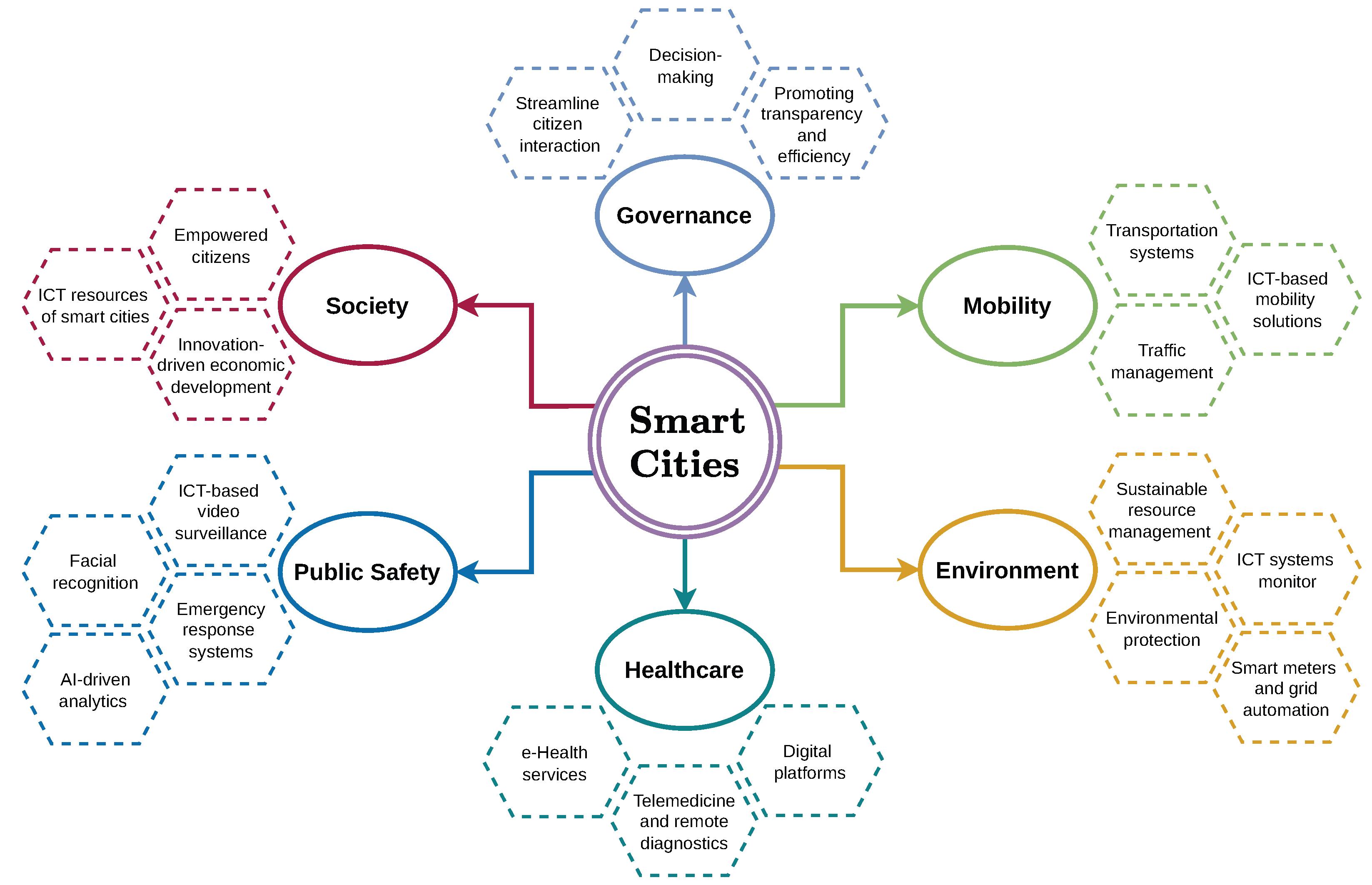

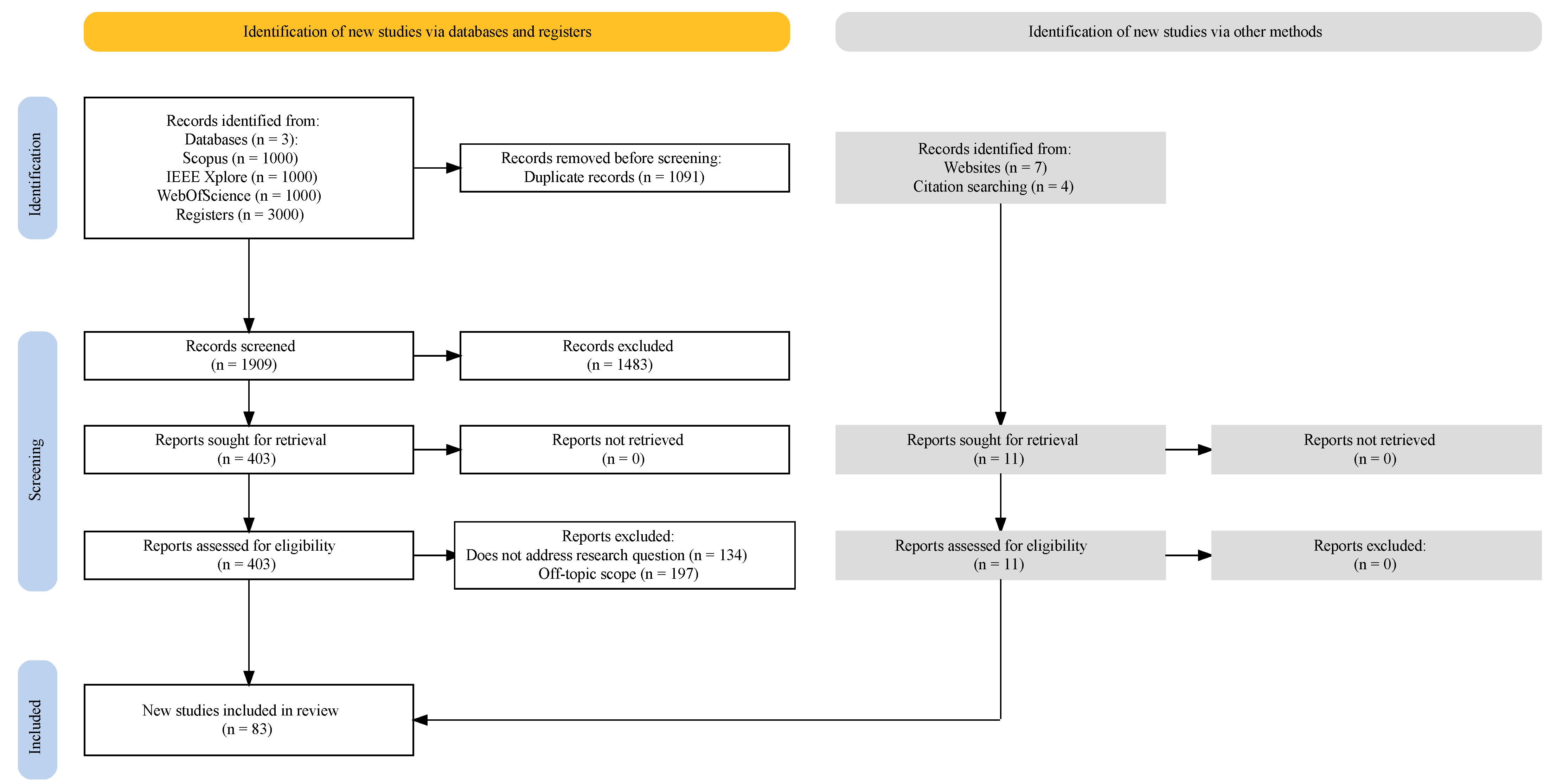

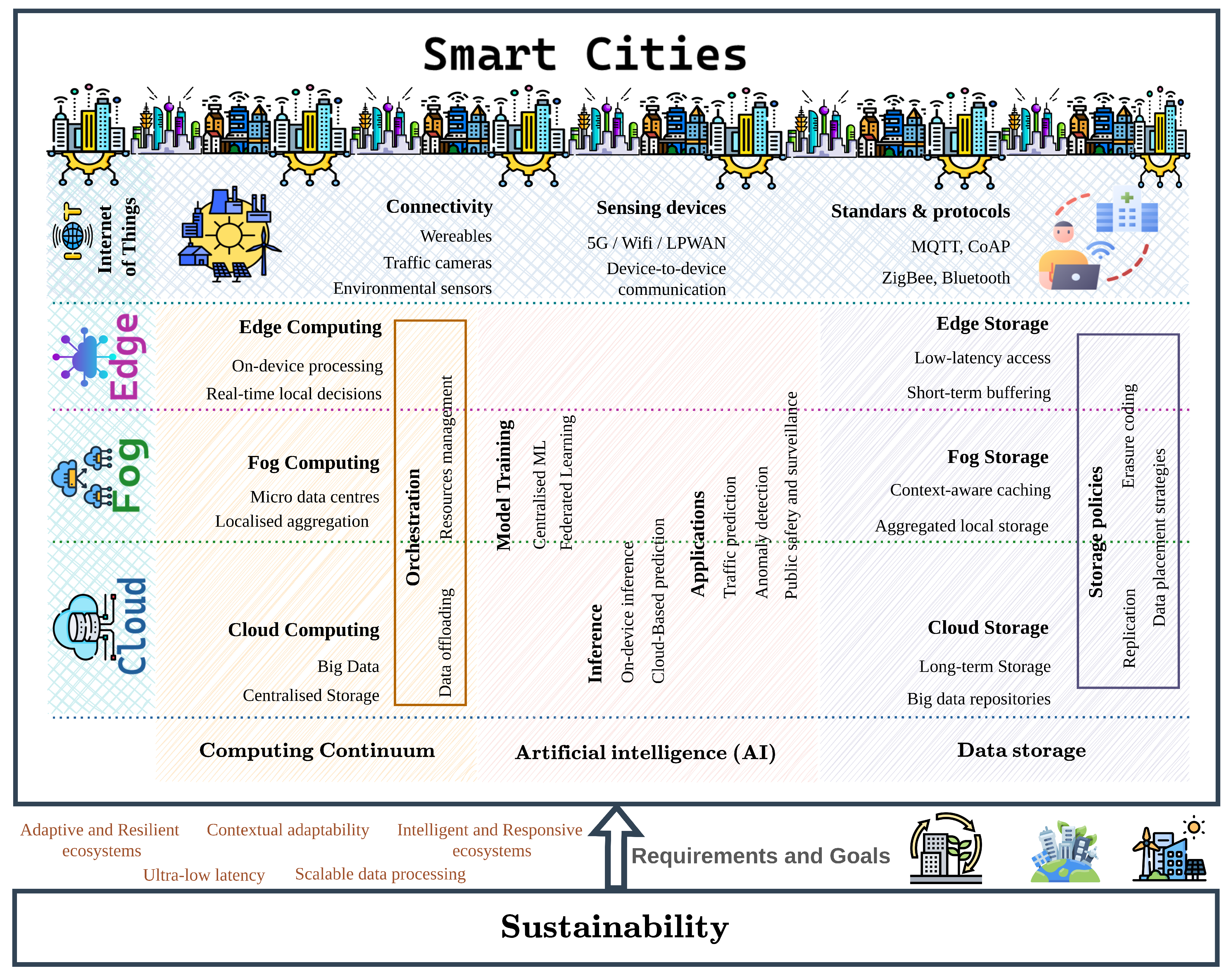
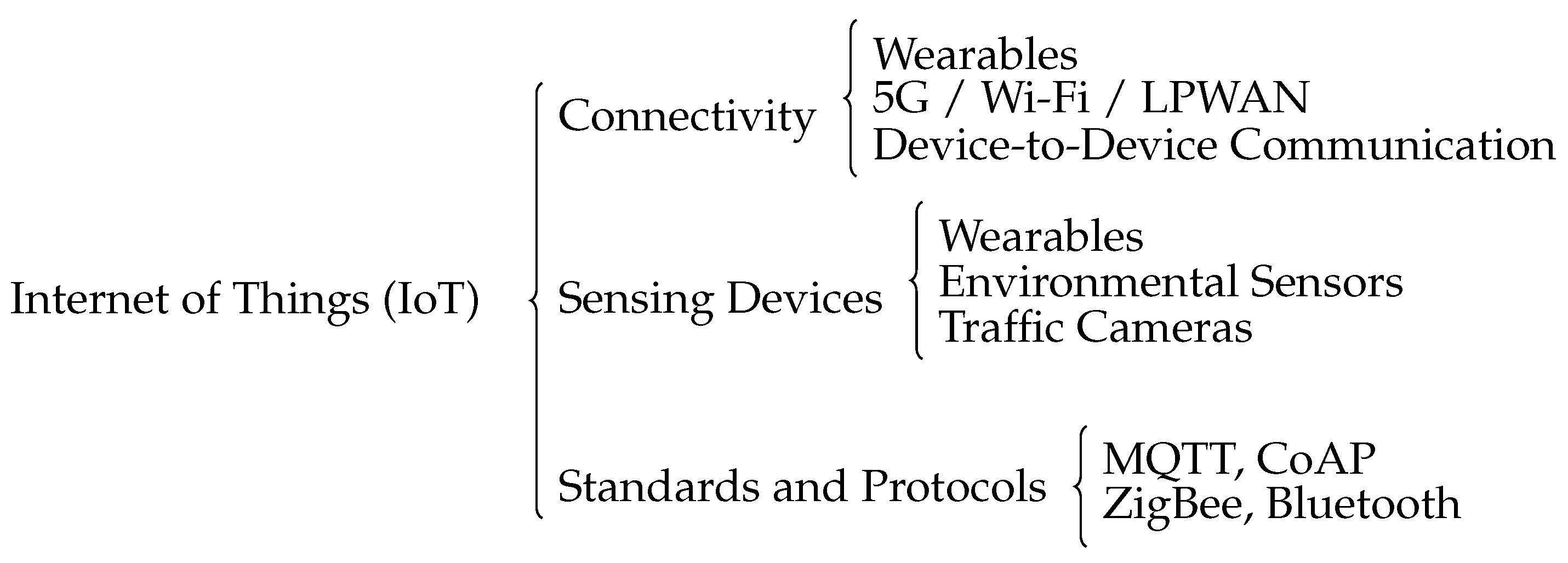
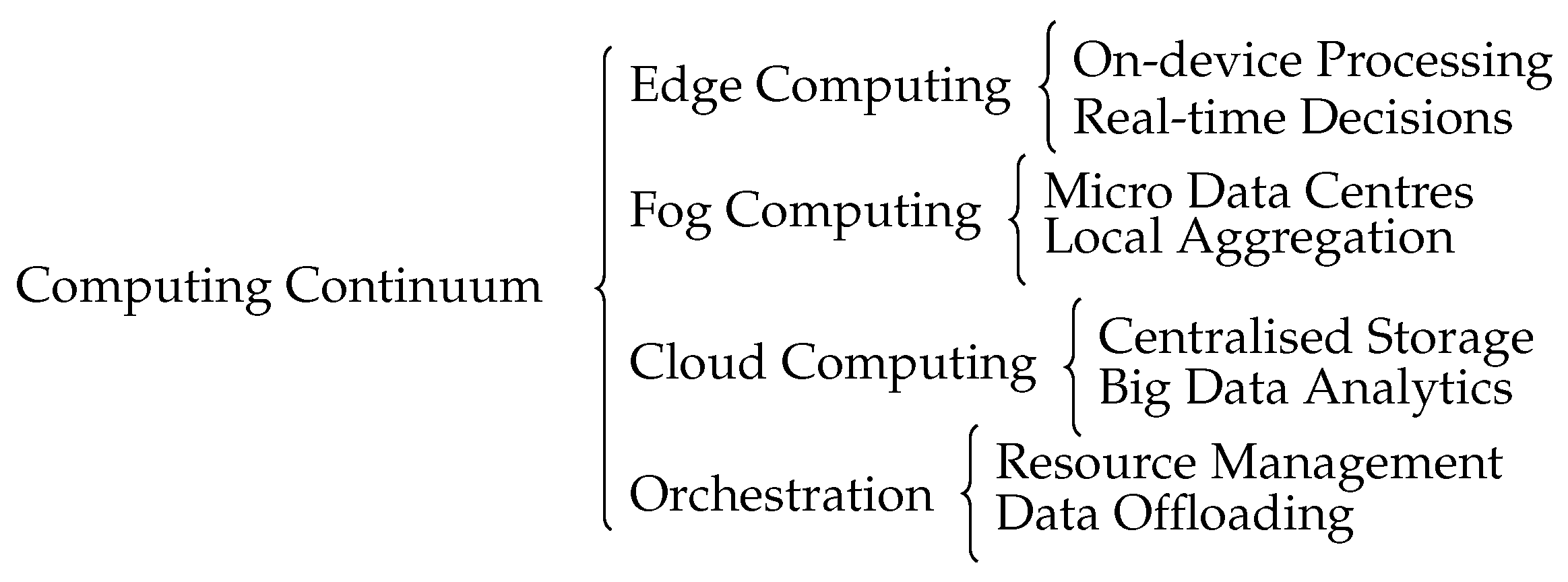

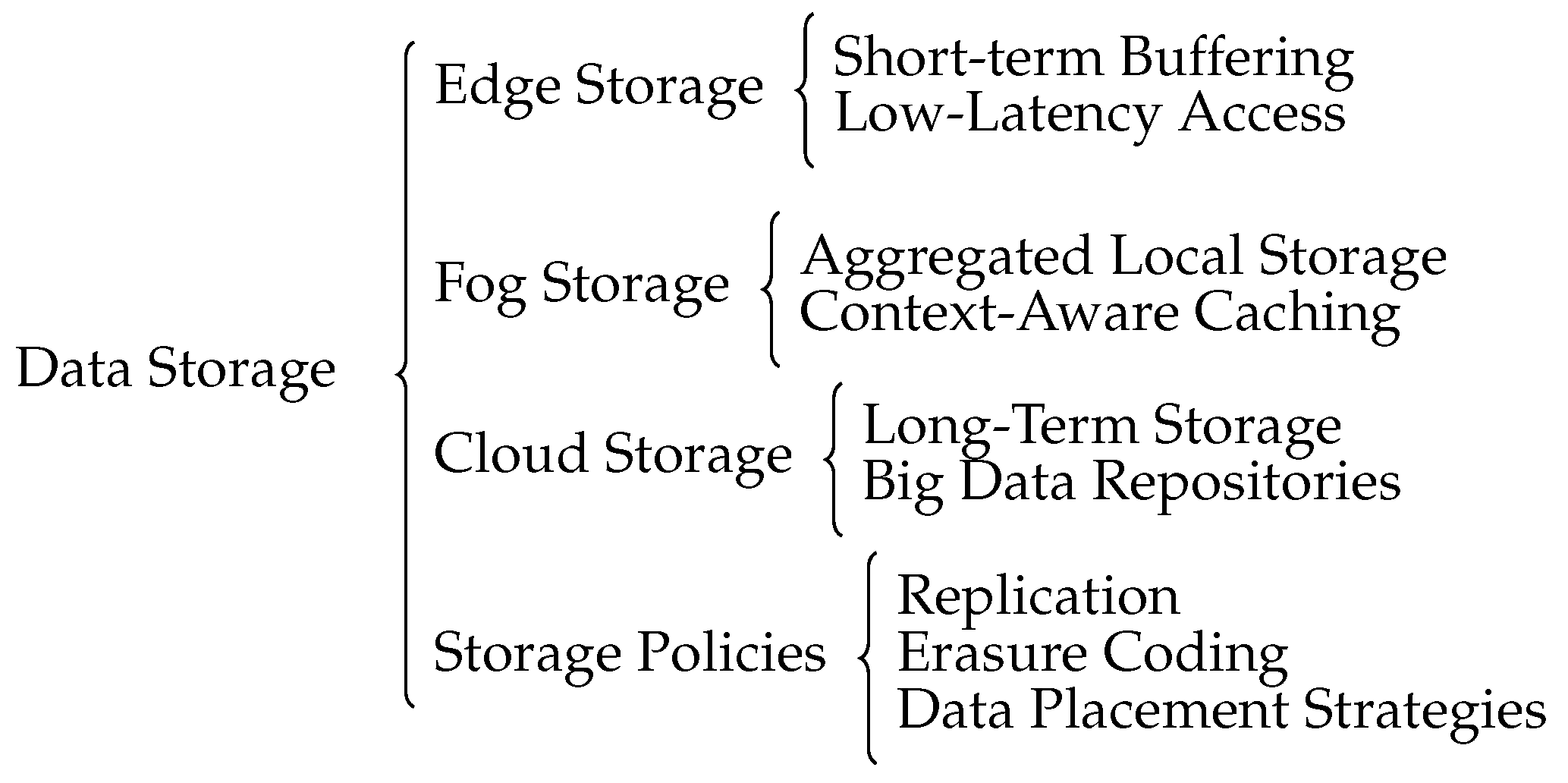
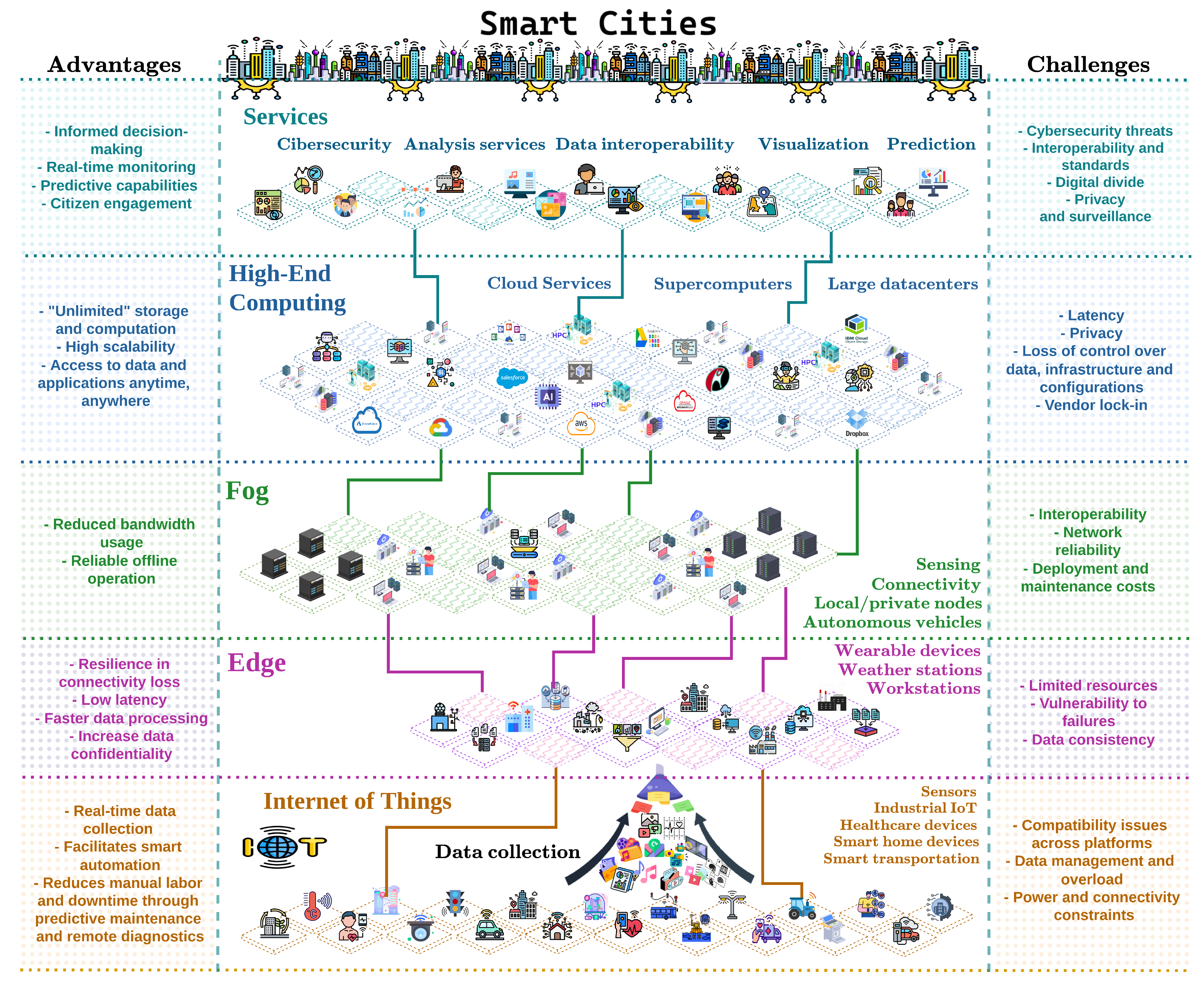
| ID | Query | Number of Publications (2020–2025) | ||
|---|---|---|---|---|
| Scopus | IEEE Xplore | WoS | ||
| Q1 | (TITLE-ABS-KEY("smart city") OR TITLE-ABS-KEY("smart cities")) AND PUBYEAR > 2019 AND (LIMIT-TO(SRCTYPE, "j") OR LIMIT-TO(SRCTYPE, "p")) AND (LIMIT-TO(DOCTYPE, "ar") OR LIMIT-TO(DOCTYPE, "cp")) AND LIMIT-TO(PUBSTAGE, "final") AND LIMIT-TO(LANGUAGE, "English") | 25,443 | 19,452 | 31,317 |
| Q2 | (TITLE-ABS-KEY("smart city") OR TITLE-ABS-KEY("smart cities")) AND (TITLE-ABS-KEY(technology) OR TITLE-ABS-KEY(applications) OR TITLE-ABS-KEY(analytics) OR TITLE-ABS-KEY("artificial intelligence") OR TITLE-ABS-KEY("computing continuum")) AND PUBYEAR > 2019 AND (LIMIT-TO(SRCTYPE, "j") OR LIMIT-TO(SRCTYPE, "p")) AND (LIMIT-TO(DOCTYPE, "ar") OR LIMIT-TO(DOCTYPE, "cp")) AND LIMIT-TO(PUBSTAGE, "final") AND LIMIT-TO(LANGUAGE, "English") | 16,288 | 15,170 | 26,225 |
| Work | Technologies Used | Containers/ Serverless | Continuum Layers | Primary Use Case | Non-Functional Req. | ||||||||
|---|---|---|---|---|---|---|---|---|---|---|---|---|---|
| IoT | Edge | Fog | Cloud | C | I | S | E | L | T | ||||
| [2] (2023) | Traditional VMs/ distributed | - | ✓ | ✓ | - | ✓ | Urban mobility (taxis, traffic) | - | - | ✓ | ✓ | ✓ | - |
| [55] (2025) | Custom ACO, VG, MPC | - | ✓ | ✓ | ✓ | ✓ | Drone-based logistics and sensing | - | - | ✓ | ✓ | ✓ | - |
| [54] (2024) | 5G, orchestration | ✓(containers) | ✓ | ✓ | ✓ | ✓ | Vehicular cooperative perception | - | - | ✓ | ✓ | ✓ | - |
| [56] (2025) | Decentralized orchestration | - | ✓ | ✓ | ✓ | ✓ | Vehicular services in motion | - | - | ✓ | ✓ | ✓ | ✓ |
| [57] (2022) | Serverless, edge-cloud | ✓(FaaS, workflows) | ✓ | ✓ | - | ✓ | Traffic safety, urban tourism | - | - | - | - | ✓ | ✓ |
| [58] (2021) | Serverless, cloud continuum | ✓(containerized FaaS) | ✓ | ✓ | - | ✓ | Face mask detection with privacy | ✓ | - | - | ✓ | ✓ | - |
| [59] (2024) | Serverless, autoscaling | ✓ | ✓ | ✓ | ✓ | ✓ | Health emergency response | - | - | ✓ | - | ✓ | - |
| [60] (2022) | Blockchain, PaaS, DSL | ✓(PaaS deployment) | ✓ | ✓ | ✓ | ✓ | Marketing pipelines, digital health | ✓ | ✓ | ✓ | - | - | ✓ |
| [61] (2023) | Smart contracts, DApp | - | - | - | - | ✓ | Real-estate transaction automation | - | ✓ | - | - | - | ✓ |
| [62] (2023) | Ethereum, smart contracts | - | - | - | - | ✓ | E-voting and civic engagement | ✓ | ✓ | - | - | - | ✓ |
| [65] (2021) | Lightweight blockchain, sub/global chains | - | ✓ | ✓ | ✓ | ✓ | Cross-domain communication | ✓ | ✓ | ✓ | - | - | ✓ |
| [4] (2020) | Distributed privacy, encryption | - | ✓ | ✓ | ✓ | ✓ | Smart energy demand prediction | ✓ | ✓ | - | ✓ | - | - |
| [66] (2024) | Federated learning, GCN, privacy | - | ✓ | ✓ | - | ✓ | Traffic pattern prediction | ✓ | - | ✓ | ✓ | - | - |
| [67] (2025) | Quantum cryptography, digital signatures | - | ✓ | ✓ | - | ✓ | Traffic data protection | ✓ | ✓ | - | - | - | ✓ |
| [68] (2021) | LoP-based encryption and division | - | ✓ | ✓ | ✓ | - | Aggregated sensor data processing | ✓ | - | ✓ | ✓ | - | - |
| Smart City Services | Amsterdam | Bangalore | Santander | Seoul | Singapore |
|---|---|---|---|---|---|
| Smart Transportation | Smart mobility platform (MaaS), real-time public transit data | Intelligent traffic management system, smart signal lights | Sensor-based traffic monitoring, smart parking | T-money card, AI-powered traffic flow management | Autonomous vehicle trials, smart traffic lights, MaaS |
| E-Governance | Open data portal, digital citizen services | Digital city dashboard, mobile apps for municipal services | SmartSantander platform for municipal data access | Mobile government services (e-Gov), IoT-enabled governance | MyInfo e-services platform, SingPass for digital identity |
| Environmental Monitoring | Air and noise pollution sensors, smart waste bins | Smart water and energy meters, waste management tracking | 20,000+ IoT sensors for air, noise, and light | Smart waste collection, IoT for air quality and noise | Smart Nation Sensor Platform, real-time air and water quality monitoring |
| Smart Energy | Smart grid integration, energy-positive neighbourhoods | Automatic meter reading for utilities, rooftop solar systems | Energy-efficient lighting, smart meters | Building energy management systems, national smart grid | Smart buildings, nationwide smart grid with real-time usage data |
| Healthcare | Telemedicine pilots, digital health data exchange | E-health records, remote consultation apps | Health apps integrated with city services | AI diagnosis assistance, remote health monitoring | HealthHub portal, telehealth, and elderly care tech |
| Citizen Engagement | Apps for public participation (e.g., FixMyStreet), urban innovation labs | Public grievance redressal apps, open feedback portals | Real-time issue reporting via app, citizen data crowdsourcing | Smart Seoul app, citizen co-creation projects | OneService app for reporting municipal issues, digital engagement via GovTech |
| Safety and Security | Smart street lighting, video surveillance in public spaces | AI-powered surveillance, emergency response systems | Video analytics for public safety, emergency alert systems | Closed-circuit televisions with AI facial recognition, real-time crime mapping | Predictive policing, integrated surveillance systems |
| Data and Innovation | Amsterdam smart city platform, open data collaborations | IoT-based city dashboards, data exchange platform (IUDX) | Urban lab testing IoT pilots, open research datasets | Big data hub for urban planning, public–private innovation labs | Open data portal, Smart Nation R&D initiatives |
Disclaimer/Publisher’s Note: The statements, opinions and data contained in all publications are solely those of the individual author(s) and contributor(s) and not of MDPI and/or the editor(s). MDPI and/or the editor(s) disclaim responsibility for any injury to people or property resulting from any ideas, methods, instructions or products referred to in the content. |
© 2025 by the authors. Licensee MDPI, Basel, Switzerland. This article is an open access article distributed under the terms and conditions of the Creative Commons Attribution (CC BY) license (https://creativecommons.org/licenses/by/4.0/).
Share and Cite
Sanchez-Gallegos, D.D.; Carrizales-Espinoza, D.E.; Torres-Charles, C.; Carretero, J. Smart Cities: A Systematic Review of Emerging Technologies. Smart Cities 2025, 8, 173. https://doi.org/10.3390/smartcities8050173
Sanchez-Gallegos DD, Carrizales-Espinoza DE, Torres-Charles C, Carretero J. Smart Cities: A Systematic Review of Emerging Technologies. Smart Cities. 2025; 8(5):173. https://doi.org/10.3390/smartcities8050173
Chicago/Turabian StyleSanchez-Gallegos, Dante D., Diana E. Carrizales-Espinoza, Catherine Torres-Charles, and Jesus Carretero. 2025. "Smart Cities: A Systematic Review of Emerging Technologies" Smart Cities 8, no. 5: 173. https://doi.org/10.3390/smartcities8050173
APA StyleSanchez-Gallegos, D. D., Carrizales-Espinoza, D. E., Torres-Charles, C., & Carretero, J. (2025). Smart Cities: A Systematic Review of Emerging Technologies. Smart Cities, 8(5), 173. https://doi.org/10.3390/smartcities8050173






